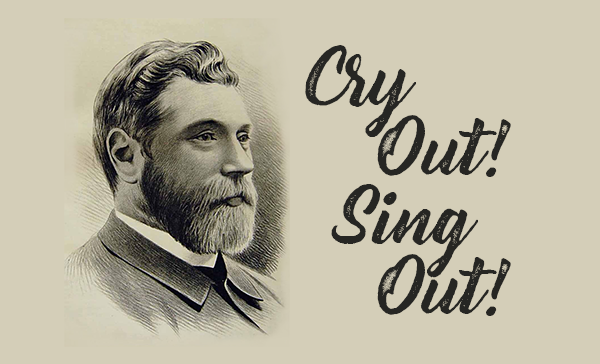
“Let the word of Christ dwell in you richly, teaching and admonishing one another in all wisdom,
singing psalms and hymns and spiritual songs, with thankfulness in your hearts to God.” – Colossians 3:16
There can be no wondering why God instructs us to sing hymns together. When they reflect the truth of God’s Word, they can often engage our emotions in unique ways. Sometimes they are bold declarations of God’s promises; other times they are laments or cries for help. In each situation, the hymns that we sing are the cadence of the Church throughout history. They tie us to stories of God’s faithfulness. As we see God’s faithfulness in His Word and also throughout His Church, we can see more clearly His faithfulness in our lives.
One of these stories of God’s faithfulness is found in George Matheson, a Scottish pastor who lived in the nineteenth century. Matheson was the eldest of eight children and was born with very poor eyesight. When he was a student in seminary, his eyesight became significantly worse. It was not long before he went completely blind. When his fiancé found out about his condition, she called off their engagement. He also had to wonder how he was going to finish seminary as a blind student. In the midst of this crisis, Matheson turned to one of his sisters to help him get through his studies. Can you imagine learning to read Hebrew and Greek after recently losing your sight? Matheson knew the Lord was calling him to be a pastor, and through his sister’s help, God provided.
Ashamed of his blindness Matheson chose to hide it from the public. He would memorize every sermon, word for word, after his sister helped him prepare them. Many of his own parishioners did not even realize that he was blind. Despite his feelings, God used Matheson’s blindness to impact his sermons. They were so well received that Queen Victoria invited Matheson to preach for her and published his sermon on the book of Job. The Lord was faithful to use Matheson in ways he never dreamed possible. He even had opportunities to lecture in different universities and received an honorary doctorate from the University of Aberdeen.
It would be an understatement to say that Matheson depended upon his sister throughout this whole time. She was his greatest supporter and his assistant in every endeavor. When Matheson was 40 years old, his sister became engaged. His life was about to be radically changed. On the night before she got married, Matheson experienced a breakdown. He cried out to God for help.
In his journal he would write: “I was alone in the manse at that time. It was the night of my sister’s marriage, and the rest of the family were staying overnight in Glasgow. Something happened to me, which was known only to myself, and which caused me the most severe mental suffering. The hymn was the fruit of that suffering. It was the quickest bit of work I ever did in my life. I had the impression of having it dictated to me by some inward voice rather than of working it out myself. I am quite sure that the whole work was completed in five minutes, and equally sure that it never received at my hands any retouching or correction. I have no natural gift of rhythm. All the other verses I have ever written are manufactured articles; this came like a dayspring from on high.”
What words did God put in Matheson’s heart?
“O Love that wilt not let me go,
I rest my weary soul in thee;
I give thee back the life I owe,
that in Thine ocean depths its flow,
may richer, fuller be.”
There have been four different tunes to this hymn, but still the message of God’s faithfulness shines through. This is the story of God’s good provision for all who call upon His name and walk with Him through life. The third verse was originally written:
“O Joy that seekest me through pain,
I cannot close my heart to thee;
I climb the rainbow through the rain,
and feel the promise is not vain,
that morn shall tearless be.”
In Christ we climb the rainbow through the rain and feel that God’s great promises to us are not in vain. One day morn shall tearless be.
~Pastor Bennett







